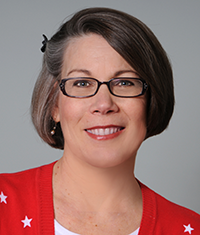The Fog of Grief
Author: Betsy Beard
To be a part of the TAPS Online Community, click on Online Community on the right at the very top of the screen. Then register to join.
Most of us functioned fairly competently in our day-to-day lives—holding jobs or attending college, raising children, reading books, taking care of our health, entertaining friends and family—right up until someone we loved stopped living. Instantly we become disorganized, distracted, distraught, distressed, and disoriented. It’s no wonder everything seems foggy. The things we once did by habit even seem difficult, to say nothing of more challenging tasks like attending college, working at our jobs, or continuing to maintain family ties or raise children.

Confusion, forgetfulness, anxiety, and lack of concentration seem to be our constant companions. We put the ice cream away in the pantry and put the car keys in the freezer. We miss appointments. We forget to brush our teeth. And the only reason the children and pets are fed may be that they make enough noise to get our attention.
We fear that we are going crazy or that we have started to exhibit early signs of Alzheimer's. But the fog and the mental confusion are actually symptoms of extreme stress and grief. Physically, the stress affects us so that we don't feel like eating, we don't sleep well, and we don't have the energy to exercise. Mentally, we are preoccupied, trying to make sense of the loss. All of these factors contribute to the fog of grief.
One recent thread on the TAPS message boards dealt with this issue. Here's what some of our TAPS respondents had to say on the subject.
Karen, surviving mom of Jeffrey, started the conversation with this observation: It happens daily, that brain fog-you know the one. I have trouble remembering names, appointments, special days (such as a family birthday), what I just read, or what I just heard. I am having such a hard time concentrating… I have good intentions, but find my mind wandering off to think of my son. "Why? Why? Why?" is the only thing I can concentrate on, trying to figure out things that I will never be able to untangle and solve. It's a challenge to try to work through the brain fog. Thanks for all the support from those who have messaged and sent words of encouragement. Just wanted to vent a bit.
Renice Zimmerman, surviving spouse of Doug, encouraged Karen to vent away, knowing that our community of survivors would understand. She wrote: For me, the first year after I lost my husband was numb and foggy. Reality set in the second year, and the fog lifted. I also embedded in my brain the constant reminder my husband expected me to continue to live and carry on-not only for myself, but for our college-age son. Now I am almost six years being a widow. Not a day goes by that I don't miss Doug, think of him, talk to him, even yell at him, but I have adjusted to living without him. Vent away! All here understand.
Others added to the thread to lend support or give suggestions.
Holly Higgins, surviving mom of Dan, added: I so understand your concerns about not being able to concentrate. I lost my son in Afghanistan. I can't believe it will soon be twenty months... It can't be. But it is. Work is such a challenge. But so is every day. I ask the same questions you do, "Why? Why? Why?" My heart goes out to you. Knowing your child died just makes the whole world feel messed up. Nothing makes sense anymore. I don't suppose I am providing much encouragement, but I hope at least I can provide support so that you know you are not alone.\
Ellen Andrews, surviving fiancée of David, wrote: A brain fog is exactly what I had. Concentration was difficult, at best. I think my brain was trying to process so much information and come to terms with the reality, that it would just grow tired and not function at optimum levels all the time.
Kim Suggs, surviving spouse of Milton, shared: With time some of the fog lifts. Somehow life seems to move on and you are moving along with it, just at a slower pace than you were used to. Sometimes we need to be guided along. This is not an easy path that we've been on, but there is support along the way. Just remember to reach out. There are many of us here who know what you are going through, care, and are there to guide you along the way.
Carol Lane, surviving mom of Bryon, wrote: It does lift, but even farther on you may find that every once in a while it pops up again. One thing I learned is to write lists of things that have to be done, so when they come up, I go to the lists and can function.
Allie Bemis, surviving sister of Keith, wrote: Brain fog is such an appropriate a term for those "wait, what did I miss again?" moments. My brain fog moments have been pretty numerous since my big brother died in August. My poor fiancé will tell me something, and he tells me I acknowledge it and then forget it. Finally, I had to start writing things down in multiple places. For my grandmother-in-law's birthday, I had to put a reminder in my paper calendar, one in my Google calendar, and then a reminder in my phone calendar. That way, if the bright colors in my planner didn't remind me enough, the beeping from my phone would. There are days when the fog hangs around and then days when suddenly I feel like I can remember everything without writing it down. It just changes and I make sure to have everything backed up.
John Ruiz, surviving father of Clint, expressed the thoughts of many: I had no idea that this was actually related to our losing our son. Thank you so much for posting this question-I just thought I was losing my mind. Now that I know, I can stop giving myself such a hard time about it.
This is the beauty of the Online Community Message Boards. Someone raises a question or starts a topic and others can contribute with support, encouragement, compassion, suggestions, and empathy. We no longer feel quite so isolated and crazy.
Many of the suggestions above can help you in the early months of grieving. Here are some additional thoughts.
- Remind yourself that your brain fog is normal for your situation.
- Lower your expectations of what you can accomplish these days.
- Divide tasks into smaller increments and adjust your goals.
- Give yourself extra time for getting ready for events.
- Start slowly to rebuild a daily routine that will give you new habits.
- Buy a special notebook for your lists. It's harder to lose a notebook than a scrap of paper.
- Review your lists at the beginning of the day and as often as needed.
- Above all, be patient with yourself.
Although you will never be the same person you were before the death of your loved one, realize that you will make progress in your grief journey. Your ability to function will not always be this challenging, and you will eventually emerge from the fog.

 By Betsy Beard, Surviving mom of U.S. Army SPC Bradley S. Beard: Betsy Beard served as the editor of TAPS Magazine for seven years in addition to volunteering as a peer mentor, care group facilitator, and national workshop presenter. In that time she authored a number of TAPS publications and Quick Series Guides, as well as the award-winning children's book, Klinger: A Story of Honor and Hope and many articles for TAPS Magazine. Betsy has been published in Living with Loss publications and various newspapers. She currently is a freelance book editor and serves as the awards director of Military Writers Society of America. She lives in North Carolina with her husband, Randy.
By Betsy Beard, Surviving mom of U.S. Army SPC Bradley S. Beard: Betsy Beard served as the editor of TAPS Magazine for seven years in addition to volunteering as a peer mentor, care group facilitator, and national workshop presenter. In that time she authored a number of TAPS publications and Quick Series Guides, as well as the award-winning children's book, Klinger: A Story of Honor and Hope and many articles for TAPS Magazine. Betsy has been published in Living with Loss publications and various newspapers. She currently is a freelance book editor and serves as the awards director of Military Writers Society of America. She lives in North Carolina with her husband, Randy.